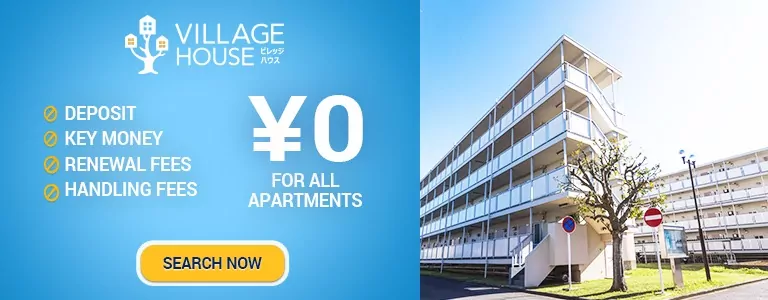Finding an apartment in Japan can sometimes be a bit of a challenge. Searches can be long, and once you finally find your ideal apartment, you surely are happy to submit your application. Unfortunately, there are still chances of your application not being accepted, due to various factors. In this article, we will discuss the top reasons why your application could get rejected.
If you are currently looking for a place to rent, Village House is a more carefree option that might be just right for you, so please also have a look at our available rental apartments!
Low Income
The first reason as to why your application was rejected might be because your income isn’t high enough.
Around the world, the best rule of thumb when it comes to renting a house is that your rent should not be higher than about 33% of your salary.
Some landlords and property managers in Japan use a similar calculation based on your income by multiples of 36, which means that your annual income should be at least 36 times the rent for the apartment you are hoping to get.
For example, let’s say you are hoping to rent an apartment that costs around ¥50,000 the amount of income that you will need to make it around 36% is ¥1,800,000. Another example would be if the apartment you are hoping to rent in Japan costs ¥80,000 then the amount of income you would need would be around ¥2,880,000 annually. On the higher end of the scale if you wanted to rent an apartment that cost ¥112,000, then you would need to be making ¥4,320,000 annually.
Not making enough money is one of the biggest reasons as to why landlords in Japan will reject your rental application.

Your guarantor’s income isn’t high enough.
If you are from a western-style country, the term guarantor might seem strange to you. A guarantor is a person who will pay on your behalf if you are not able to pay your rent. Most landlords in Japan require you to pick a guarantor as part of your rental application. Some companies cater to foreigners and don’t need one, or if you are only planning on staying for a couple of months you might not need a guarantor as well.
All people living in Japan, require a guarantor. That means that both foreigners and Japanese people will need to get a guarantor. Many people in Japan use family members as their guarantor. One problem facing Japan at the moment is the aging society. As more and more people retire, they are no longer able to act as guarantors for their family as once they go on pension their monthly income goes down.
One way around this is to use a rent guarantor company. For a small fee which is about a third to a full month’s rent, a guarantor company will act as your guarantor. Most landlords nowadays more or less prefer you to use a company as they are seen as less risky.
Your job is seen as being unstable.
In almost every country, landlords will need to see that you are working or have a form of income.
Tenants in Japan are very strongly protected by laws, and it is not easy for a landlord to evict a tenant, even more so after they have a history of paying their rent on time.
What landlords want is to avoid a situation where they might have to evict you for not paying your bills on time. A good way landlords can avoid that nightmare is by picking a tenant with a good job at a well-known company.
If you are a contract employee, work for a dispatch company, are self-employed, or own your own business, you might find it a bit harder to find a place as you might be perceived as a risky renter.

Being a Foreigner in Japan
Next up is a bit of a big one. If you are a foreigner, you might face something called housing discrimination.
Discrimination is defined as “the unjust or prejudicial treatment of different categories of people, especially on the grounds of race, age, or sex.”
Now, if you are a foreigner in Japan, you might have already faced a little bit of discrimination. It happens, there are people all over the world who will judge you based on your looks alone. If you are trying to find a place in Japan, it can happen and does happen to many people.
You may have everything that the landlord is looking for, but you may still be rejected because you are not Japanese. It is not legal, and it’s not right by any means but it still does happen to many people.
In 2016 the Japanese government conducted the first survey on discrimination against foreigners living in Japan. They found that about 39% of foreigners living in Japan over the past 5 years reported that their application was rejected based on the fact that they were not Japanese. 52% said that they had never been denied housing based on the fact that they were foreigners.
In another question, about 27% of foreigners responded with the fact that they had given up looking for a place to live in Japan due to all the signs saying “No foreigners”.
So, it is unfortunate, but not unlikely that you will experience such a situation while looking for a home to rent in Japan. If you do face housing discrimination, there are places where you can go to file a report. The Japanese government has been more active over the years active with trying to become more foreign-friendly.
If you are renting with Village House, you don’t need to be concerned about such a scenario, as we are welcoming foreigners from all nationalities!

Having Pets
The last reason on our list of reasons as to why your rental application got denied is that you could have pets. Now, it is a no brainer that many places will not allow pets in western countries and, in Japan, it’s no different. Pets are wonderful but it can be hard to find an apartment that allows pets in Japan. The Japanese style of housing and apartments are much different than other countries as they are much smaller and the walls are thinner. If you have pets you might find it a bit more challenging to find an apartment that allows pets. As Village House offers pet-friendly apartments, please feel free to reach out to our customer support center for more information.
And that is it for our list of reasons as to why your rental application might get denied in Japan. Good luck with your apartment hunt!
Related articles:
- First Time Renting Alone? Essential Questions to Ask Your Real Estate Agent
- Apartment Viewing for People Living Alone: What You Need to Check and How to Be Ideally Prepared!
- A Foreigner’s Guide to Clearing the Tenant Screening Process
- All the Documents You Need when Signing a Rental Contract and Applying for an Apartment



